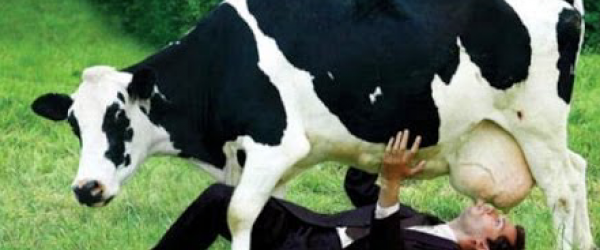
Support of dairy is short on facts
November 23rd, 2017Andrew Knight is a veterinary Professor of Animal Welfare, and part of SAFE’s team.
SAFE’s video showing a cow cantering after a trailer loaded with calves – one of which may have been her own – has been reported by more than 30 media outlets internationally. This seems to have upset NZFarmer.co.nz Editorialist Jon Morgan.
He strongly objects to SAFE’s ‘claim’ that the video portrayed a “‘distressed’ cow ‘chasing’ after her calves”. However, there are two problems with Mr Morgan’s critique. The first is that SAFE never actually made any such claim. What we really stated was simply that “This video showing a cow chasing after a trailer was sent to SAFE by a concerned member of the public.” The second is that although we never made the claim Mr Morgan attributes to us, it nevertheless has a significant ring of truth to it.

SAFE’s video shows a cow chasing after a trailer of calves
The bond between cow and calf is very strong. Millennia of survival challenges have conferred an advantage to calves who bond closely with their mothers. Unsurprisingly therefore, numerous studies have shown that early weaning causes a stress response in cows. Behaviour can be markedly altered, with some cows searching for their lost calves for days. Many farmers will be familiar with their prolonged bellowing, following calf removal. Calves also vocalise for prolonged periods and may alter their behaviour during this time. Use of a judgement bias test (a type of psychological test) has demonstrated mood depression in calves following maternal separation, similar to that seen by calves in pain following hot-iron dehorning.
Around two million bobby calves annually are separated from their mothers, normally within 12 hours of birth, so that we might drink their milk. Most are then sent to slaughter at the legal minimum of just four days of age. Is it really ethical that we cause such distress to so many calves and their mothers annually, for profit? And further, that we inflict this distress repeatedly on cows, year after year, until discarding them for slaughter when their milk yields or fertility start to decline?
Drinking milk into adulthood, and from another species, is almost unknown in nature
After all, milk is not necessary to support any vital human need. Virtually no other species chooses to drink milk into adulthood, and particularly, milk sourced from another species. Seagulls occasionally consume the milk of lactating elephant seals, but across the entire animal kingdom, there are almost no other examples.
The official positions of dietary associations near-invariably recognise that milk is not essential within the human diet. On the other hand, dairy products are high in cholesterol and saturated fat, which can increase the risk of heart disease. They’ve been linked to increased risks of various cancers, especially prostate, ovarian, lung and breast cancers. One study found that women consuming more than one glass of milk daily had a 73% greater chance of ovarian cancer. Another found that men who consume a diet high in red, processed meat and dairy have a 2.5 times greater risk of cancer mortality. Another found those consuming more than one glass of milk daily were 10 percent more likely to experience cognitive decline. Dairy products have also been linked to health risks for children, and can encourage the development of obesity, diabetes and heart disease. I could go on.
Mr Morgan objects to a claim SAFE never made, but which nevertheless has a ring of truth to it. His editorial is long on opinion, but very short on facts. Instead of attacking people who care about unnecessary suffering, and who are interested in the facts about cow and calf welfare and human dietary needs, Mr Morgan would do better to engage in some critical reflection on his own position.
 SAFE Animal Squad
SAFE Animal Squad